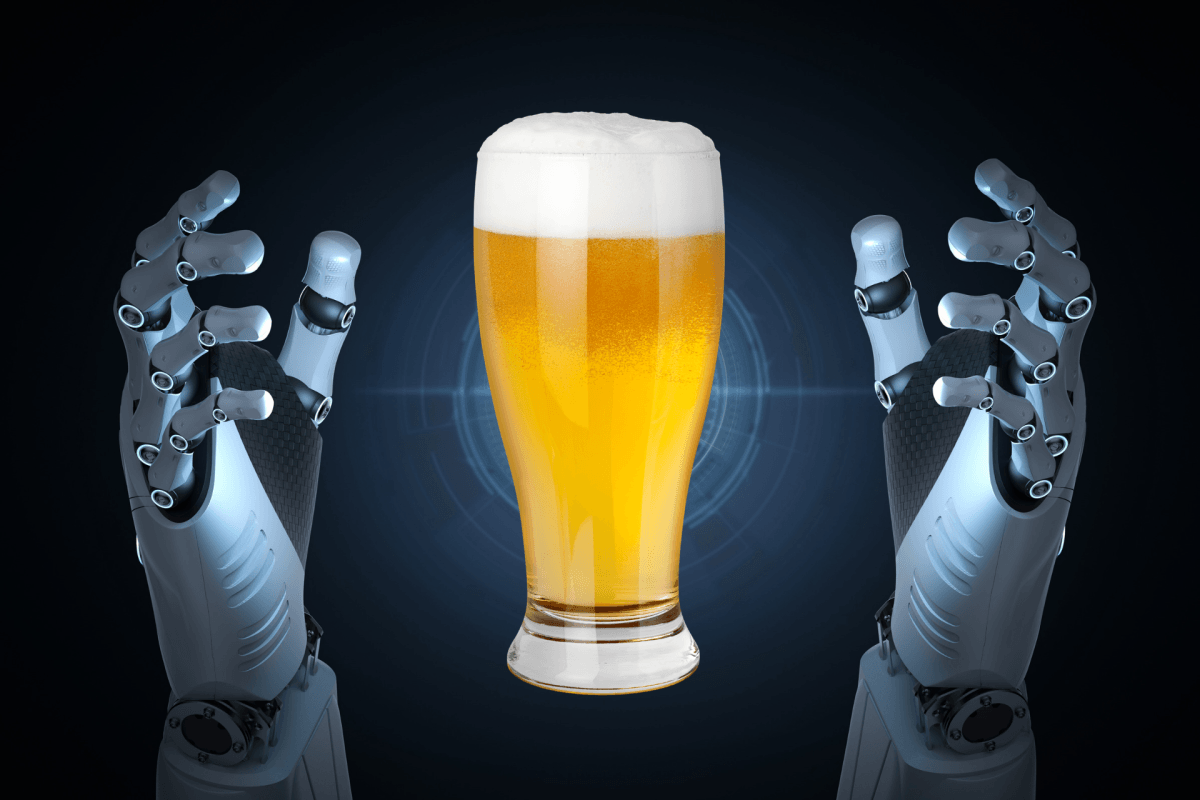Your cart is empty

ChatGPT- Beyond Artificially Intelligent Beer
Millions of people are trying their hand using the AI tools available today. Whether generating images or copy, we seem to be edging closer to a reality reminiscent of The Matrix, Bladerunner or Brave New World.
It’s not all bad. Evolving AI can be used as a tool to change the way we work and hopefully make all of our lives better. With that being said, how do current AI trends mesh with the beer universe?
Recently, The Brülosophy Show used ChatGPT to create an award-winning beer recipe. They trained the platform on recipe construction. The AI then provided a list of ingredients and a complete step-by-step brewing process
Check out their youtube channel to find out the surprising results. But the ChatGPT craze goes much further than brewing award-winning beers.
What is Artificial Intelligence?
Stanford University states that artificial intelligence is “the science and engineering of making intelligent machines, especially intelligent computer programs [...] AI does not have to confine itself to methods that are biologically observable.”
The development of AI is to produce machines that can autonomously do things far exceeding the capabilities of the human mind.
AI platforms accomplish this feat by being able to perform heavily computational functions in milliseconds or less.
Craft Brewers Using AI
The ChatGPT craze has already infected independent brewers as well. In the USA, Colorado brewers Banded Oak Brewing and Old 121 Brewing collaborated with the platform to produce AIPA. Likewise, British Columbia’s Whistle Buoy Brewing Co. produced an AI-designed but human-brewed hazy pale ale named Robo Beer.
Recipe creation is only the beginning. Brewers have been looking into the implementation of AI for some time now. In 2019, Sugar Creek Brewing of North Carolina adopted artificial intelligence into their packaging process.

Image source: Unsplash
Packing is only one area where professional brewing can be improved through the implementation of AI
By combining sensors with photo recognition and cloud technology, they automated packaging line adjustments to reduce beer foaming. Normally, this would require constant monitoring by team members but this pain was eliminated. This one process change is saving the craft brewery around $10,000 per month! That’s a big deal considering the current cost of living crisis.
Savings this big are thought to protect jobs. By saving money, small business owners can invest more in their staff. However, what if AI evolves to the point humans are almost unnecessary for brewing and other occupations?
Jobs and AI
For several decades now, scientists, anthropologists, and other subject matter experts have been apprehensive about the development and use of artificial intelligence. Stephen Hawking famously warned that AI could “spell the end of the human race [...] Humans, who are limited by slow biological evolution, couldn't compete and would be superseded."
Hawking’s warning provides a bleak vision of possibilities. The jury is still out on whether we are on course for a Terminator 2-style “Judgement Day.” In reality, the first likely sign of humanity’s demise to machines is rooted in a much less entertaining extinction: the elimination of jobs.
It's only natural for people to have fears about job security in the face of AI technology's ever-increasing capabilities. However, many experts in this field suggest we're getting ahead of ourselves by not only underestimating the possible benefits to society, but by overlooking good ol' human adaptability.
To be clear, some jobs will inevitably be eliminated by AI, while many (if not most) industries will be altered by it, but this doesn't have to mean the end of humanity is near. MIT economist David Autor offers some good perspective in this regard, by pointing out that more than 60% of the jobs people do today didn't even exist in the 1940's, while many of the jobs that did exist back then have since been replaced.
AI is bound to change many industries in the coming years, but some sectors will be forced to adapt sooner than others.
Jobs Most at Risk to AI Language Modelling
A timely report from Ed Felten, Manav Raj, Robert Seamans has looked at how language modellers like ChatGPT will affect occupations and industries. What they found was that the rapid improvements in language modelling altered what jobs were at risk due to AI technologies.
According to their study, the following are the top 10 occupations most exposed to language modelling:
- Telemarketers
- English language and literature teachers
- Foreign language and literature teachers
- History teachers
- Law teachers
- Philosophy and religion teachers
- Sociology teachers
- Political science teachers
- Criminal justice and law enforcement teachers
- Sociologists
Surprisingly, content writing and journalism aren’t on this list. In case you were wondering who or what was writing this article—we think we are still currently mostly human!
Improvement Still Needed
While OpenAI has put out a product that is levels above its predecessors it’s not all rainbows. Many users have found that the AI’s responses are full of self-confident errors and purely made-up facts.
The developers of AI continue to attempt to eliminate these errors that seem to go against a program’s training. Because their source is somewhat unknown, they have been deemed as AI “hallucinations.”
Augment, Not Replace Jobs
While it appears that AI tech like language modelling is set to replace jobs, others view AI as simply enhancing or altering the way we work. Experts with this point of view expect new job types to be created through the augmentation of AI.
For example, let’s take a content writing role for a brewery blog. The writer wouldn’t copy/paste an article from a platform like ChatGPT (never!). Instead, the writer could prompt the AI during the research phase while fact-checking to correct hallucinations.
Writers may even get inspiration for content and structure from the language modeller's responses. From this point of view, AI is a “thought partner.”
AI Job Opportunities
Despite many assuming AI advancements are creating a dystopian society run entirely by robots, the vast majority of current applications involve some degree of human control and direction.
With that fact in mind, AI technology offers many job opportunities for people looking to adapt with this new industry, such as:
- AI Research Scientist
- AI Data Analytics
- AI Consultant
- AI Software Engineer
- AI Sales
Some might need to shift their career focus in order to pursue these kinds of jobs. In the future, governments and businesses can help people adjust to the changing employment landscape with an emphasis on retraining, improving STEM skills and much more.
Conclusion
AI technology like language modelling is going to keep improving whether you like it or not. Who knows, maybe the next big advertising campaign you watch during a sporting event will have been completely generated by AI?
At Sheep in Wolf's Clothing Brewery, we think it better to embrace change rather than fear it. You can do the same by educating yourself on current trends and expert predictions. AI may affect your job in the future but it doesn't have to be a bad thing!
- Choosing a selection results in a full page refresh.


